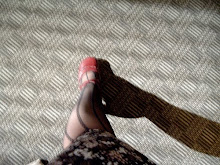Fascism advances... liberty retreats
I can't vouch for the journalistic quality of the LA Times, but this seems both plausible and frightening. Sickening, frankly:
Will voices of dissent still be heard?; U.S. firms now need OK to publish authors from nations under sanction.; [HOME EDITION]
Scott Martelle. Los Angeles Times. Los Angeles, Calif.: Dec 7, 2004. pg. E.1
http://pqasb.pqarchiver.com/latimes/755435841.html?did=755435841&FMT=ABS&FMTS=FT&date=Dec+7%2C+2004&author=
Scott+Martelle&desc=Will+voices+of+dissent+still+be+heard%3F%3B+
U.S.+firms+now+need+OK+to+publish+authors+from+nations+
under+sanction.
(you have to pay to read the article, but here is a synopsis from what I deem a reliable source)
As reported in the Los Angeles Times, the federal Office of Foreign Assets (OFAC) has now criminalized the efforts of any US publisher who publishes the work of any writer in Iran, Iraq, Sudan, North Korea, or Cuba (list to be expanded). The penalties: $1 million for the publisher, 10 years in prison and a $250,000 fine for individuals. However, if the publisher applies for a license to publish a particular work and the Office of Foreign Assets likes the work, it will issue a license. The excuse is the 1917 Trading with the Enemy Act. Academic publishers can make minor changes to works by authors they had previously published, but anything substantial, such as illustrations, is verboten. US publishers have now abandoned plans to publish books on Cuban architecture and on birds. One result of the reg is that US publishers cannot assist Shirin Ebadi, the 2003 Nobel Peace Prize winner from Iran, in crafting her memoirs of surviving Iran's Islamic revolution. Under the regulations,
even if a publisher obtains a license, it could not assist in the advertising of any of these works. The spokesperson for the U.S. Treasury Department, which oversees OFAC said that the sanctions are: "...a very important part of our overall national security. These are countries that pose serious threats to the United States, to our economy and security and our well being around the globe." A lawsuit has been filed in the U.S. District Court in New York to overturn the regulation (Plaintiffs include the PEN American Center, Arcade Publishing, and Shirin Ebadi).
Will voices of dissent still be heard?; U.S. firms now need OK to publish authors from nations under sanction.; [HOME EDITION]
Scott Martelle. Los Angeles Times. Los Angeles, Calif.: Dec 7, 2004. pg. E.1
http://pqasb.pqarchiver.com/latimes/755435841.html?did=755435841&FMT=ABS&FMTS=FT&date=Dec+7%2C+2004&author=
Scott+Martelle&desc=Will+voices+of+dissent+still+be+heard%3F%3B+
U.S.+firms+now+need+OK+to+publish+authors+from+nations+
under+sanction.
(you have to pay to read the article, but here is a synopsis from what I deem a reliable source)
As reported in the Los Angeles Times, the federal Office of Foreign Assets (OFAC) has now criminalized the efforts of any US publisher who publishes the work of any writer in Iran, Iraq, Sudan, North Korea, or Cuba (list to be expanded). The penalties: $1 million for the publisher, 10 years in prison and a $250,000 fine for individuals. However, if the publisher applies for a license to publish a particular work and the Office of Foreign Assets likes the work, it will issue a license. The excuse is the 1917 Trading with the Enemy Act. Academic publishers can make minor changes to works by authors they had previously published, but anything substantial, such as illustrations, is verboten. US publishers have now abandoned plans to publish books on Cuban architecture and on birds. One result of the reg is that US publishers cannot assist Shirin Ebadi, the 2003 Nobel Peace Prize winner from Iran, in crafting her memoirs of surviving Iran's Islamic revolution. Under the regulations,
even if a publisher obtains a license, it could not assist in the advertising of any of these works. The spokesperson for the U.S. Treasury Department, which oversees OFAC said that the sanctions are: "...a very important part of our overall national security. These are countries that pose serious threats to the United States, to our economy and security and our well being around the globe." A lawsuit has been filed in the U.S. District Court in New York to overturn the regulation (Plaintiffs include the PEN American Center, Arcade Publishing, and Shirin Ebadi).




0 Comments:
Publicar un comentario
<< Home